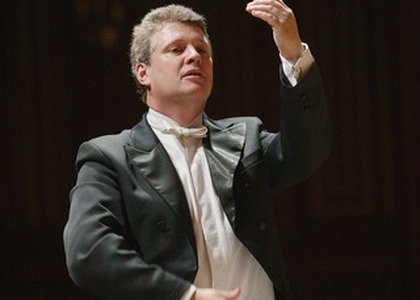> [Archived] Interviews

Interview with conductor Alexander Walker
On the stage of the Romanian Athenaeum, the "George Enescu" Philharmonic Orchestra will perform on Thursday and Friday, February 17th and 18th, a symphonic concert containing works by Antonin Dvorak, Bela Bartok and Ludwig van Beethoven. The soloist will be the Romanian violinist Mircea Călin, concertmaster of the Antwerp Orchestra. British conductor Alexander Walker will be at the rostrum.
Mr. Alexander Walker, on February 17th and 18th, you are invited to conduct the George Enescu Philharmonic Orchestra. As we know, you are often the guest conductor of the Bucharest Philharmonic. How would you describe the collaboration with the ensemble?
It's a wonderful orchestra. I have worked with them before, I think it is about the fifth time I come to Romania, and each time I chose to work on opposites which means a lot to me. For example, Szymanowski's Third Symphony, I worked on Gergar's Dream of Elgar and other works. It is an orchestra with a very special sound, an orchestra with a sound that has a very cultivated character. For example, when I sang Elgar, I found that the sound really matched the music, and when we worked on a work that they didn't know very well, they found a way to interpret it, exactly what we were looking for, and to be honest, it's not a sound I come across very often. Orchestras in the UK have a much wider repertoire. They don't set so many rehearsals before the concert and they play fantastically, but they don't always have this richness of sound that the Romanian orchestra has.
The concert program includes works by Anthonin Dvorak, Bella Bartok and Ludwig van Beethoven. On what principles was it built?
This is an interesting question. We focus with our orchestras in these very difficult circumstances imposed by the pandemic to work with ensembles as small as possible. So an orchestra of 150 people was taken out of the discussion before we started building the program. Our wonderful soloist, Mircea Călin, will perform the two Bartok Rhapsodies. I built a program around two works and started with Nocturna by Dvorak, because it is a very beautiful work and it is interpreted very, very rarely. It was a work that Dvorak wrote as a possible slow motion for the string quintet, but then decided it was not suitable for inclusion and became a stand-alone work and is sometimes interpreted as a work for string orchestra, very very beautiful, rarely listened to. Beethoven's 7th Symphony, which completes the program, is of course one of his nine great symphonies, but one of the most frequently performed, and is probably the symphony I knew best. My father was a fan of Beethoven's Symphony No. 7, so I grew up listening to it. But it also fits in nicely with the other two works, the dynamism and the emotional charge.
As you said, the guest soloist is the violinist Mircea Călin. Will it be your first time collaborating?
Yes, that's right and I really can't wait. I want to tell you an interesting and funny story. I understand that he, Mircea Călin, is a concertmaster in Antwerp. Two weeks ago I had a concert with another violinist who told me that this week he was going to Antwerp to be a guest concertmaster. In a rather strange way, I think that he, my then concertmaster, is now taking Mircea's place. So it's going to be like I'm playing with both of you. I understand that he is a fantastic performer and that this kind of music is somehow in his blood, so I can't wait.
You have given many concerts with famous orchestras, such as the Prague Philharmonic, the Russian Philharmonic and others. How has your music life changed since the pandemic?
Of course, it was an incredibly difficult time for everyone in every profession. I hope that there is a feeling that we will overcome this stalemate now and, of course, the concerts for me have completely disappeared for a year. I managed to use that time in a positive way by thinking a little about music and to spend more time thinking about how I play music and what it means to me. I tried to find something positive among the negative aspects. But in the last six months, I think about September, coming back to singing in front of a live audience has been an incredible and exciting thing, and I think one of the important things that all musicians learned, is how music means a lot to us and how important it is for us to be in contact with other human beings, the communicative element. So I feel that most of the concerts I held, that I played in the last six months, were memorable and very important, moments that will stay in my memory for the rest of my life.
Translated by Medeea Alexandra Stan,
University of Bucharest, Faculty of Foreign Languages and Literatures, MTTLC, year I
Corrected by Silvia Petrescu














